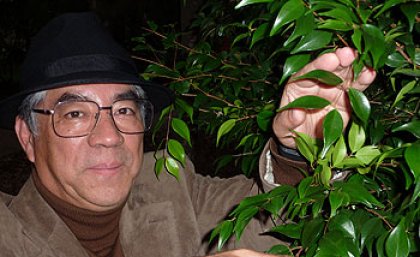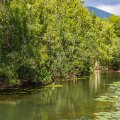
Lessons learned at Australia's national parks are expected to help a leading Japanese academic lobby for more sustainable practices in his home country.
Chuo University Professor Masahiro Yabuta is learning about sustainable management and education while working alongside colleagues at The University of Queensland's School of Tourism.
Professor Yabuta will be at the school until March next year, with plans to visit important natural sites such as the Great Barrier Reef, Uluru and Kakadu National Park.
He has been researching the management and education systems of natural and cultural heritage sites with Head of School Roy Ballantyne, senior lecturer Dr Noel Scott and senior research fellow Dr Sally Driml.
"I have come to learn about management systems in Australia because they are first-class here. I have many things to learn," Professor Yabuta said.
"It is important to keep tourism sustainable. A balance and commitment from government, industry and the community is important."
Communities and businesses wanted to make money from tourist sites, but it should not come at the destruction of the natural sites the visitors came to see, Professor Yabuta said.
"Rapid development of a tourism industry could cause problems. There needs to be protection of the environmental tourism site. There must be support from government to ensure this."
Professor Yabuta said he was also keen to find out just who the average eco-tourist was, so promotion and education programs could be specifically tailored.
"Everybody wants to be an eco-tourist now. Eco-tourism is a very fancy and popular word. It has a feel-good factor for everybody. People think going green is good for them. But when an economy driven
by eco-tourism and going green come together, it can be difficult to get a balance."
Professor Yabuta said recent research showed only about 10 per cent of people tended to consistently behave in an eco-friendly way – even when going on holidays.
"In most other instances, people sometimes behave as eco-tourists and sometimes they don't. They might have a low-flow tap but not drive an economical car. They might not save on power consumption but they do like nature."
Eco-tourism was one way to help people see the importance of being green and ensuring they did not cause destruction at sites such as national parks.
"It is all about education. It is life-long education. They need to understand protection of nature by each person is important for sustainable tourism and keeping national parks for future generations."
Professor Yabuta hopes to use what he has learned at the School of Tourism to help design government policies in Japan aimed at ensuring a balance between tourism development and environmental protection.
Media: Erik de Wit (0417 088 772, e.dewit@uq.edu.au)
.jpg)









